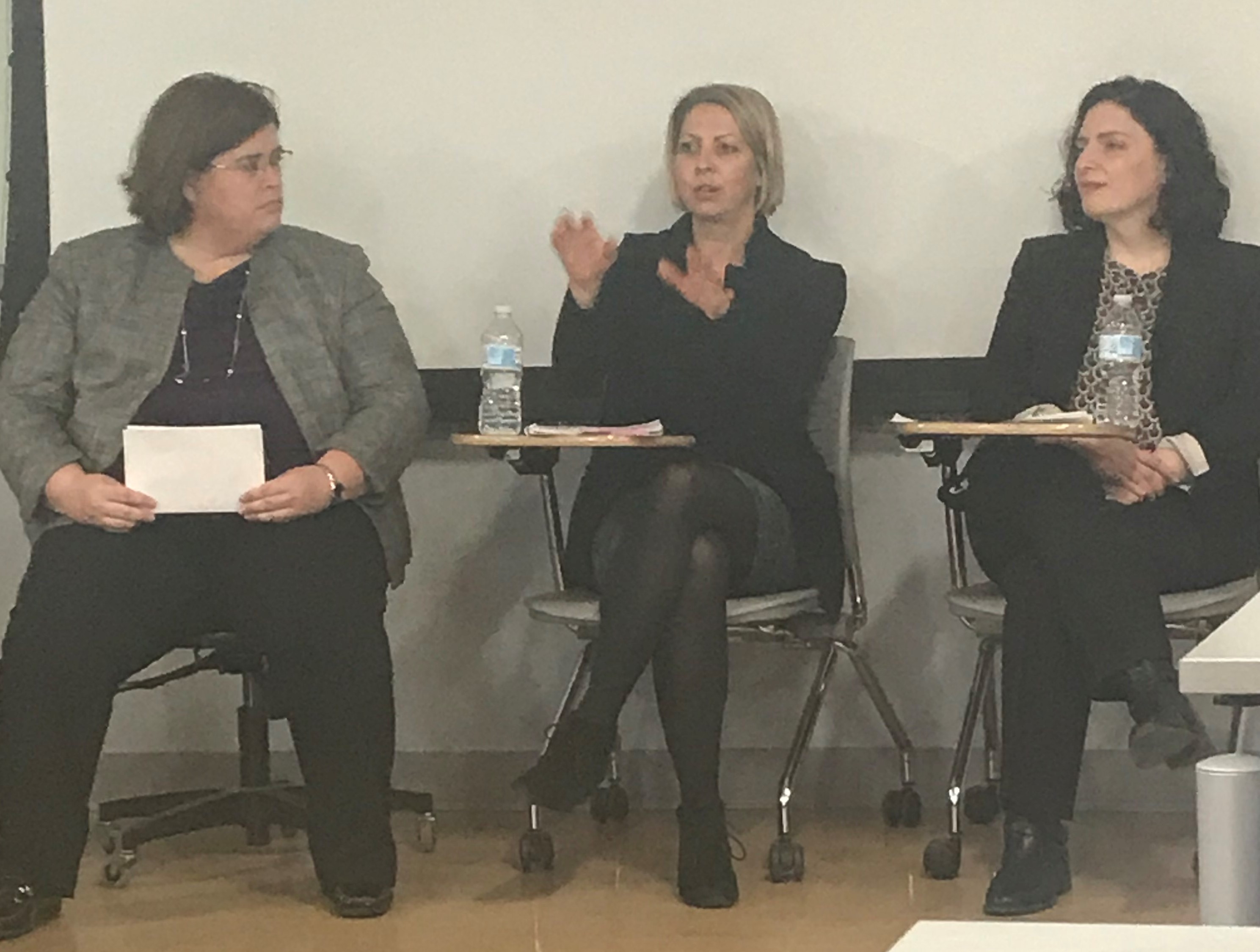2019 Career Panel: Science Policy
Career Panel: Science Policy
by Senegal Carty, GMS PhD Trainee
Date: March 27, 2019
Panelists:
Ms. Jennifer Grodsky; BU Vice President for Federal Relations
Dr. Libby O’Hare; Lewis-Burke Associates, Washington, D.C.
Dr. Naomi Webber; Lewis-Burke Associates, Washington, D.C.
While building a wealth of scientific knowledge and skills, PhD students also become very familiar with the demands of research – equipment, reagents, facilities and training, to name a few, not to mention the funds needed to procure them. They also gain an awareness of the more abstract issues that impact scientists’ work and lives. This knowledge makes doctoral degree holders well placed to bridge the gap between government and research institutions. At the recent panel discussion on careers in science policy organized by BU’s BEST and moderated by Dr. Barbara Schreiber, Associate Professor of Biochemistry and co-PI (along with Dr. Linda Hyman, Associate Provost of Graduate Medical Sciences) of BU’s BEST, three experts in the field explained the importance of this line of work and what it takes to be successful in it. The panelists were BU’s Vice President for Federal Relations, Ms. Jennifer Grodsky, and two science policy experts from Lewis-Burke Associates, Dr. Libby O’Hare and Dr. Naomi Webber.
The event began with a presentation by Ms. Grodsky on what science policy jobs entail and how they  impact scientific advancement and the lives of researchers themselves. She explained that this field involves lobbying for universities and other research institutions’ priorities, including funding for research and other important issues such as the #MeTooSTEM movement and protecting intellectual property. Ms. Grodsky also explained that an appreciation of the importance of evidence-based decisions and excellent critical thinking and communication skills, all of which become highly developed during graduate school, are valuable assets for those who do science policy work.
impact scientific advancement and the lives of researchers themselves. She explained that this field involves lobbying for universities and other research institutions’ priorities, including funding for research and other important issues such as the #MeTooSTEM movement and protecting intellectual property. Ms. Grodsky also explained that an appreciation of the importance of evidence-based decisions and excellent critical thinking and communication skills, all of which become highly developed during graduate school, are valuable assets for those who do science policy work.
When Ms. Grodsky joined the other panelists and the discussion began, Dr. Webber and Dr. O’Hare reinforced and added to the points she had made during her presentation as they shared their unique career journeys. Dr. O’Hare, who earned her PhD in Neuroscience from UCLA and went on to do postdoctoral training at UC Berkeley before entering the world of science policy, also stressed that clear communication was a must. She also revealed that in some ways, this requirement goes beyond what she learned as a graduate student. “One thing that surprised me about my job is how much time I spent on my email… a well-crafted email is actually my primary form of communication”, she explained, contrasting it to the rushed emails that are more common within a university setting.
The panelists also shared information on opportunities outside of graduate school that students can take advantage of to learn more about science policy. Dr. Webber, who earned a PhD in Physical Chemistry from the University of East Anglia and worked in US – UK research relations before joining Lewis and Burke, advised the audience to read policy blogs and papers, while Dr. O’Hare spoke about how participating in student government was an instructive experience for her as she explored the possibilities offered by this field. Another opportunity that Dr. O’Hare encouraged the attendees to consider was the AAAS Science and Technology Policy Fellowship, which she successfully applied for after her postdoctoral training. The fellowship not only provided her with a chance to gain experience, it also helped her build her professional network.
The benefits of science policy fellowships for those working on getting a foot in the door are clearly not to be underestimated, and Dr. Grodsky revealed that in addition to the AAAS Fellowship, the Jefferson Fellowship program is an excellent opportunity for university faculty to become involved in science policy. She also shared information on the Catalyzing Advocacy for Science and Education (CASE) workshop, which allows students to learn about science advocacy on Capitol Hill during spring break.
The panelists agreed that even without participation in a particular program, it is still possible and important to learn and network through other ways. In her response to a student who asked how to increase the chances of entering a specific science policy area of interest, Dr. O’Hare explained that searching online for people in that field of interest, reading about their career journeys and asking for informational interviews is an excellent way to both learn what it takes to qualify for a job and make connections. Dr. Webber stressed that in order to make sure that these connections can attest to your ability and desire to do the job you want, it’s important to ask specific questions, demonstrate interest and sell yourself during an informational interview. She also encouraged the audience never to underestimate their own abilities while building their careers, saying, “If you see something you’re interested in, go for it and don’t think, ‘Well, somebody else is probably better positioned.’”
As they gave the audience a sense of what work in science policy is like, Dr. Grodsky, Dr. Webber and Dr. O’Hare showed how their careers positively affected their lives as a whole. Each panelist clearly enjoyed her work, welcomed its challenges and motivated the audience to consider following a similar path to help propel and protect scientific research at the policy level.